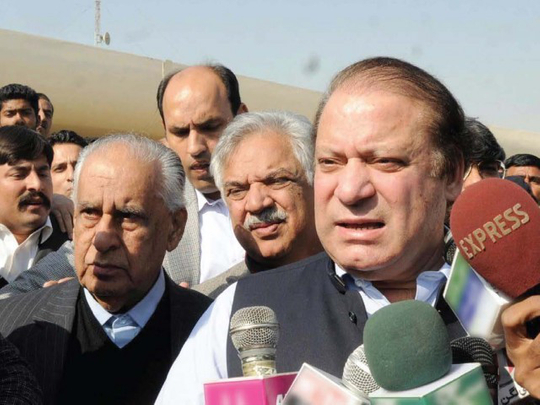
Events of the past week in Karachi will be remembered in Pakistan’s history as no less than a historical milestone. Last Monday saw an uncalled for outburst from the London-based Altaf Hussain, leader of the Muttahida Qaumi Movement (MQM), whose word for long was considered as cast in stone.
In a televised speech to his MQM constituents, Hussain described Pakistan as a “cancer for the entire world” and went on to add “Pakistan is a headache for the entire world. Pakistan is the epicentre of terrorism for the entire world. Who says long live Pakistan? ... It’s down with Pakistan”. Such a statement from a supposedly nationalist leader soon became politically suicidal, and for good reason.
In less than a day, the MQM was forced to distance itself from its leader while Hussain, for the first time, was formally stripped of his authority to run the party on a daily basis. And in subsequent moves, Hussain’s once larger-than-life figure stood in tatters with his posters on street corners torn off by anti-MQM protesters, while illegally-occupied office space in the name of MQM was reclaimed.
In stark contrast to the days when a single call from Hussain would practically shut down Pakistan’s largest city with a population of 20 million, this time around, life continued uninterrupted in spite of an end to Hussain’s rule within sight.
And yet, Pakistan needs to embrace a much wider scope of reforms to tackle the multiple challenges that the country faces, notwithstanding the sense of relief to many in Karachi over Hussain’s draconian rule coming to an end. Just four days before Hussain’s outburst, Pakistan Prime Minister Nawaz Sharif visited Karachi with a tightened security cover, much to the inconvenience of Karachi’s citizens. A close scrutiny of Sharif’s day-long trip said much about the direction taken by Pakistan’s political class. Sharif’s trip centred around the formal launch ceremony of a naval ship that Pakistan has built with Turkey’s cooperation. He also presided over an event organised by a large bank to begin a new loan scheme for the youth. Ahead of his trip came news about Sharif’s expected visits to offer condolences to the families of three of Pakistan’s national icons who passed away recently, namely Abdul Sattar Edhi, the humanitarian hero, Amjad Sabri, the widely-acclaimed spiritual music maestro, and Mohammad Hanif, one of the country’s globally-recognised cricket stars of yesteryears.
None of these visits, however, took place apparently due to a last-minute security advice. But alternatives such as inviting the family members of these national heroes to more secure locations to meet the prime minister were not even considered. And last but not the least, Sharif returned from Karachi without spending time with the city’s main figures responsible for its security. Tackling Karachi’s lawlessness has been the single-most important objective of thousands of army troops deployed in the city in recent years.
Thanks to the push by the Pakistan Army, there has been a significant decline in incidents of crime committed in Karachi. But much work still needs to be done to consolidate the hard-earned security gains in the shape of an army-led clampdown on criminal gangs in the city. Conditions in Karachi hold a major influence on Pakistan’s future, given that the city is central to the country’s business, maritime and commercial activities.
Going forward, Hussain’s outburst must serve as an important lesson. The MQM’s decision to strip Hussain of his authority is just the first step in a long-overdue set of reforms that is essential to give Pakistan a fresh direction. Large parts of Karachi still need reforms in health care services and public education.
It is therefore hardly surprising that while upper-class neighbourhoods have seen the emergence of western-styled, large shopping malls, poverty-stricken areas still wait for the authorities to provide them with the basic amenities. Though Karachi is a coastal city, some claim that half of its population does not have access to clean tap water. Instead, water-deprived locations are forced to rely on exorbitant supplies controlled by local suppliers, aptly known as the “water mafia”.
The disconnect between the rulers and the ruled in Karachi is not too different from conditions across Pakistan as a whole. Sharif’s trip to Karachi in the past week follows a long-term neglect of key issues facing Pakistan’s mainstream population. At a time when the country’s farming community, that constitutes up to 60 per cent of the country’s population, is suffering from one of the worst economic crises ever, Sharif’s government is determined to push ahead with grandiose plans of building large infrastructure projects, such as highways and railway links.
The city of Lahore, Sharif’s hometown, continues to witness the pursuit of a local rail network, to be known as the “Orange line”. The planned destruction of historical sites, to facilitate the passing of the rail track for the said project notwithstanding, the project is indicative of Sharif’s worldview. Though conservationists have objected to the project, the Sharif government continues to pursue it as its core objective.
Ultimately, the widening gap between the rich and poor all across Pakistan bears the risk of further antagonising its impoverished masses.
Farhan Bokhari is a Pakistan-based commentator who writes on political and economic matters.








